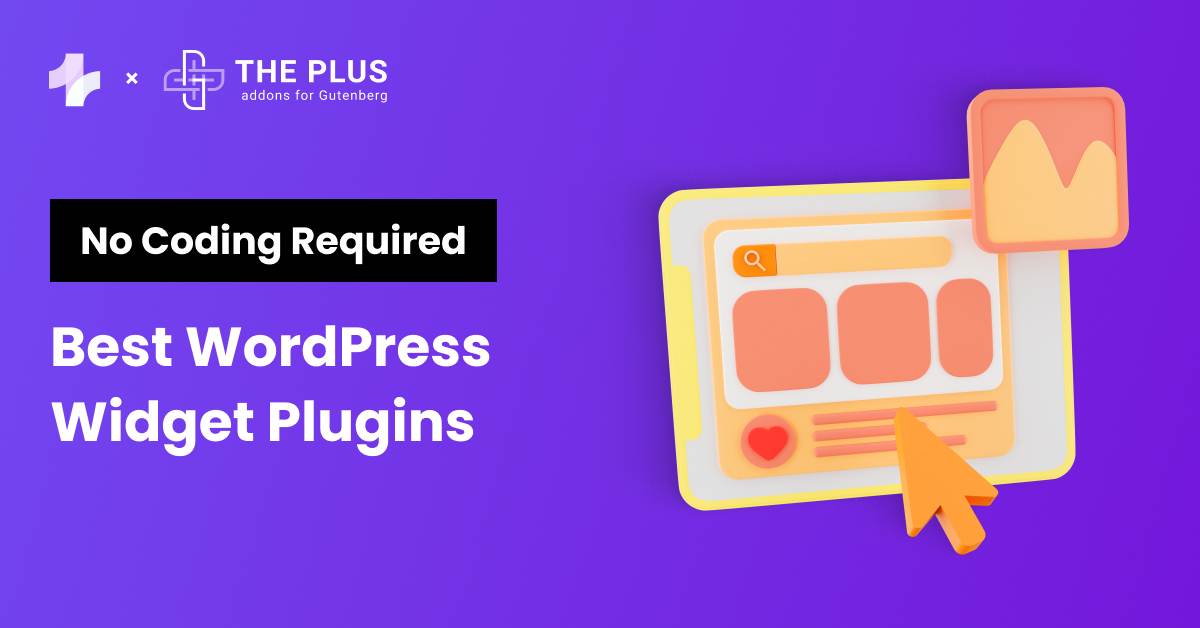Looking for the best Elementor alternatives for your website? Your search ends here.
Website design on WordPress is synonymous with Elementor page builder. Whether it is power users who prefer advanced functionalities or beginners who want to create websites without coding, Elementor is the go-to page builder for most developers.
But being a freemium page builder, many great features are locked behind a paywall. While you can use addons to enhance functionalities, installing too many addons will slow down the Elementor builder and your website.
So, to help you pick the best page builder for your website, we have compiled a list of the top five Elementor page builder alternatives.
We will also explore key features, pros and cons, and pricing of these competing page builders so you can make the right decision.
Let’s begin!
Stay ahead of the curve with our exclusive insights and analysis on the latest WordPress trends and techniques - subscribe to our newsletter today.
What Is Elementor?
Elementor is the most popular page builder for WordPress websites. It is a freemium plugin you can install from the WP repository. It adds a drag-and-drop page builder to your WordPress setup.
The free version also has over 40 handy content widgets, including an image, text editor, sidebar, Google Maps, and more. You can customize the look and feel of these widgets right in the Elementor settings to match your website’s style.
The Elementor Pro adds over 300+ prebuilt templates and widgets. You also get widgets and integrations tailored for eCommerce, marketing, theme building, etc.
| Plan Name | Number of Websites | Price per Year |
|---|---|---|
| Essential Plan | 1 | $59 |
| Expert Plan | 25 | $199 |
| Agency Plan | 1000 | $399 |
Why Look for an Elementor Alternative?
You should look for an Elementor alternative because no one size fits all. Even when Elementor is quite popular among website developers, it often fails to serve the diverse needs of many other users.
Here are some reasons why you should look for an alternate page builder for your website.
- Limited Free Features: You may want to switch to a different page builder if you prefer free access to certain features. While the free version of Elementor offers a decent set of widgets and features, some alternatives give Elementor a run for its money.
- Not a Necessity for Beginner-level Devs: WordPress has a built-in page builder, which is more than enough to create a functional website. If you do not intend to create a complex website, you do not need an Elementor page builder.
- Performance Issues: As you know, Elementor is a plugin. It is an extension installed in your WordPress setup. Elementor’s performance may take a hit if you have many plugins installed. It may even slow down your final website.
- Cheaper Alternatives: If you plan to realize the full potential of the Elementor page builder, you must upgrade to the pro version. But it may not be the perfect choice for a beginner or a small business. And hence, you must look for other options.
Best Elementor Page Builder Alternatives
Here are the top 5 alternatives for Elementor page builder.
| Sr. No. | Elementor Alternative | Cost |
|---|---|---|
| 1 | Gutenberg | Free |
| 2 | WPBakery | $59/lifetime |
| 3 | Divi | $89/year |
| 4 | Brizy | $108/year |
| 5 | Oxygen | $129/lifetime |
1. Gutenberg
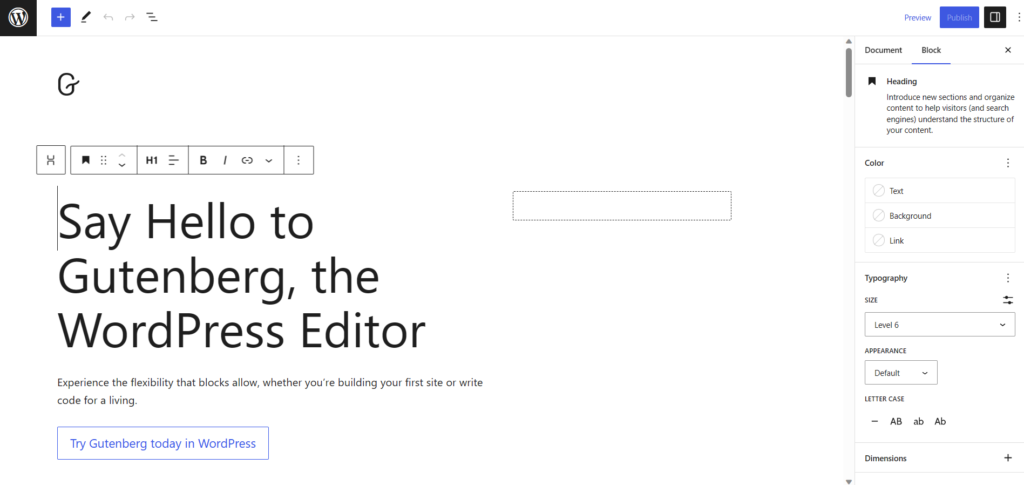
The first Elementor alternative on our list is the Gutenberg block editor. It is the default WordPress page builder, so you do not need to install any third-party plugin to use Gutenberg. It is one of the best free alternatives to Elementor.
Hence, it is the best choice if you want to keep things simple, reduce plugin clutter, and create fast-loading websites.
Like Elementor, Gutenberg is a visual page builder that lets developers drag and drop content blocks to create posts and pages.
Even though it is preinstalled into WordPress, it also includes advanced features like third-party app embeds, payment integrations, contact forms, etc.
Key Features of Gutenberg
- Visual Drag and Drop Builder: Gutenberg’s back end is intuitive and beginner-friendly. Just like Elementor, you can drag and drop widgets to your pages. You can customize their look and feel by editing typography, colors, backgrounds, etc.
- Over 50 Blocks: To simplify things, you get over 50 blocks in categories like text, media, embeds, design, eCommerce, forms, and more. You can pick blocks from these blocks to design a fully functional website.
- Seamless Integration with WordPress Ecosystem: As mentioned earlier, Gutenberg is the default WordPress back-end editor. So, it works seamlessly with any theme, third-party plugins, and addons.
- Prebuilt Patterns/Templates: Every time you add a new page, you can pick from a wide range of prebuilt designs. So, designing websites using Gutenberg is not a hassle. You can also tweak these designs in the block editor per your needs.
Pros of Gutenberg
- It is free and comes preinstalled with WordPress.
- It is an ideal page builder for beginners due to the availability of blocks and drag-and-drop builders.
- Prebuilt patterns and responsive designs.
Cons of Gutenberg
- Relatively a newer page builder, which is still under development. So, bugs are to be expected.
- Limited customization options for blocks and templates.
Pricing of Gutenberg
Gutenberg block editor for WordPress is free. It comes built-in with WordPress, so no plugin installation is required.
How to Enhance Your Gutenberg Editor With Advanced Functionality?
Gutenberg is beginner-friendly due to its blocks-based design process, but it is still a relatively newer product compared to Elementor. However, being the default WordPress editor, it works seamlessly with third-party plugins. So, using an addon is the best way to get the most out of Gutenberg.
We recommend using The Plus Blocks for Gutenberg, a freemium addon with more than 85 blocks, including mega menus, a popup builder, product listings, carousels, and more. Besides, the addon has optimized CSS and JS, and all blocks have clean markup.
The Plus Blocks for Gutenberg brings a vast collection of widgets, design elements, and customizations to the table.
See more details below:
- The Gutenberg Blocks: This collection of over 85 customizable blocks is tailored for Gutenberg. Here’s what all you get:
- Essential Blocks: As the name suggests, these blocks include all the crucial elements of a modern website. You get over 25 blocks, including Google Maps, a pie chart, a progress bar, a message box, tables, and more.
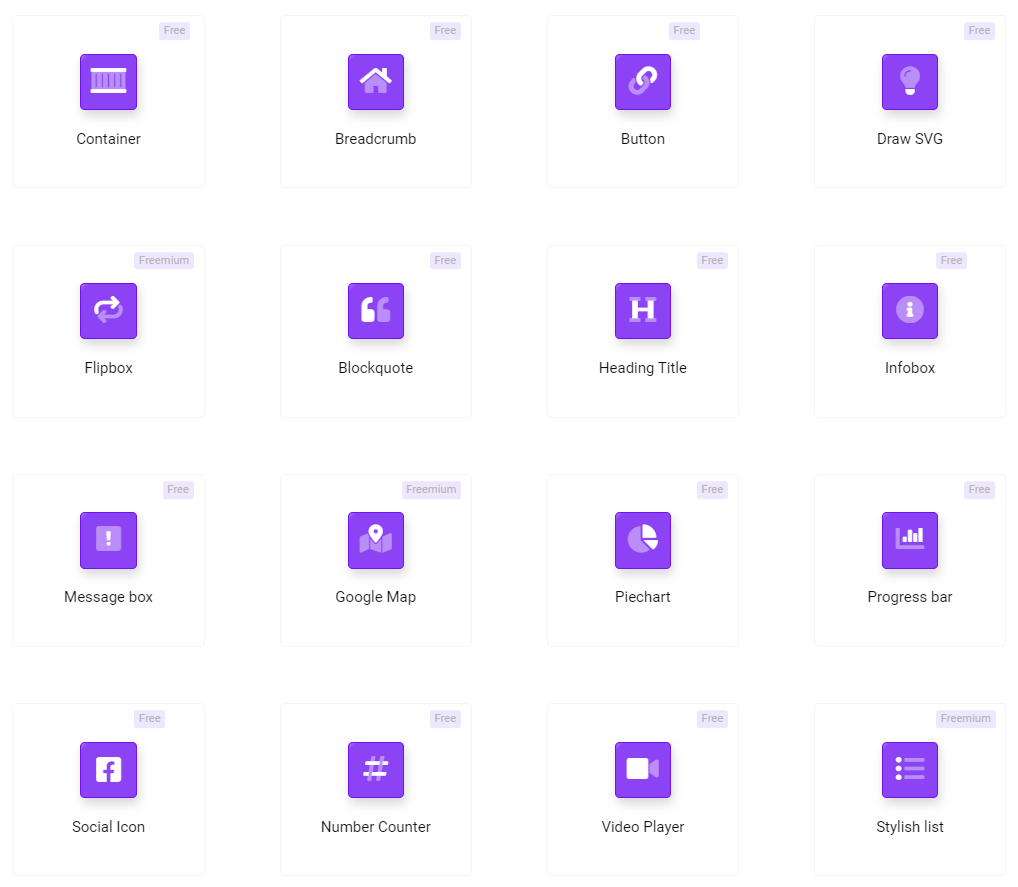
Check the entire list of Essential Blocks here.
- Creative Blocks: It is a collection of about 20+ special blocks like hover card, carousels, timelines, process steps, animated elements, etc.
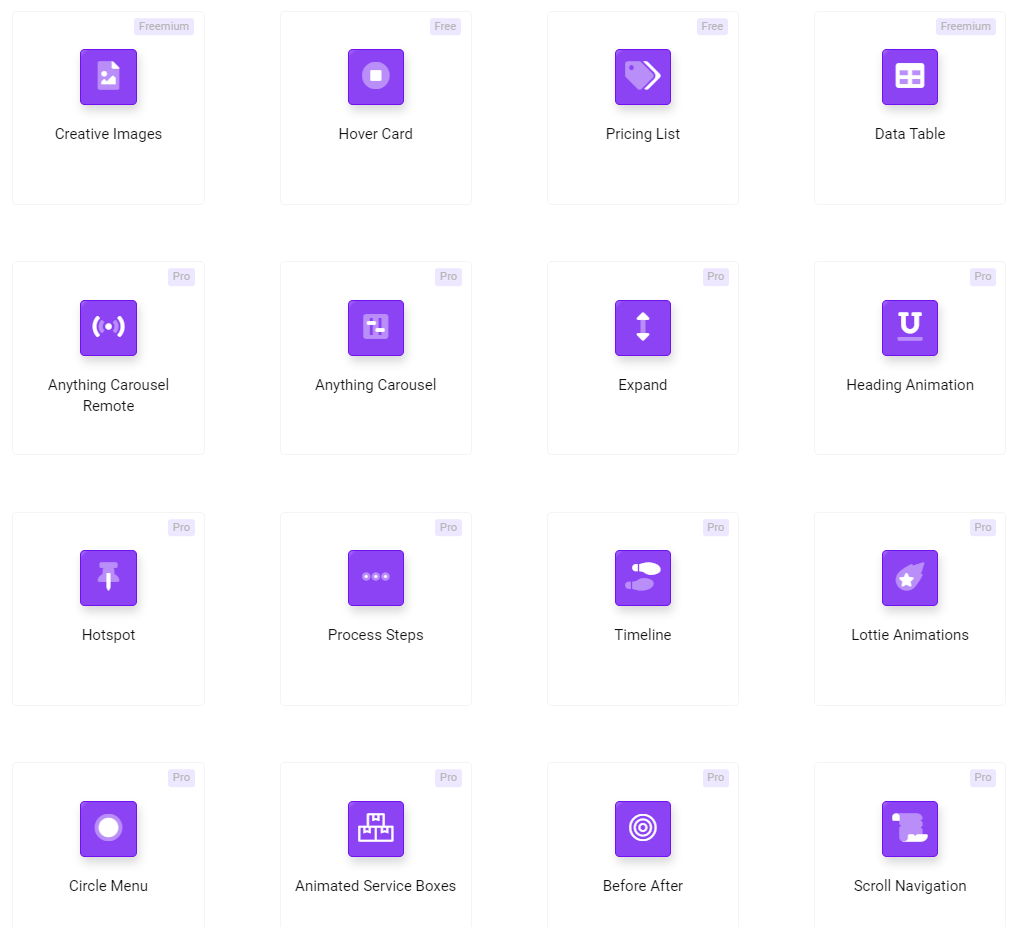
Check the entire list of Creative Blocks here.
- Container Blocks: It is a collection of ready-to-use background blocks. You get four backgrounds – container, parallax, canvas, and gallery.

List of container blocks that are part of The Plus Blocks.
- Marketing Blocks: This collection includes a CTA banner, form styler, Mailchimp, and a handful of other marketing-specific blocks.
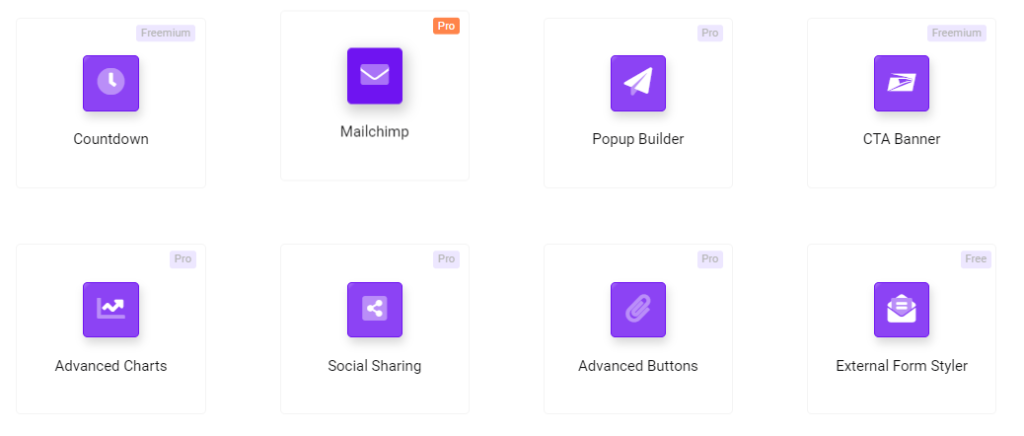
Check the complete list of The Plus Blocks’ marketing widgets here.
- Social Blocks: These blocks power your social media efforts through social feeds, badges, review walls, embeds, etc.

See the complete list of The Plus Blocks’ social web page elements here.
- The Listings Blocks: This collection of blocks is meant specifically for listing content on your website. You get carousels and layouts like a grid, masonry, etc., for your blogs, testimonials, and WooCommerce product pages. You also get dedicated image gallery blocks for media.
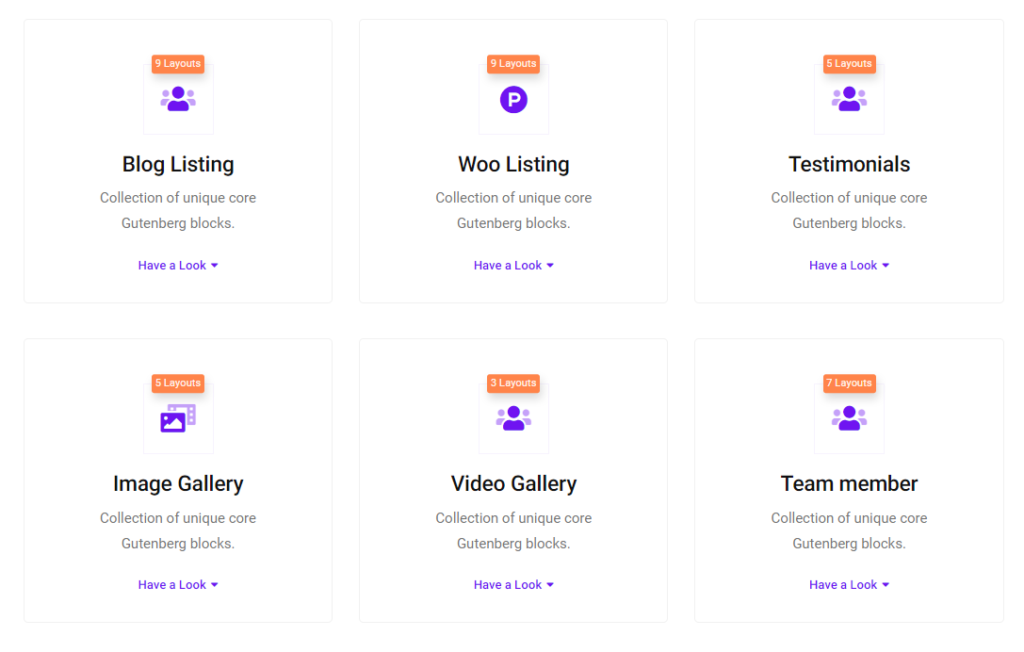
See the complete catalog of The Plus Blocks’ listing elements here.
- The Builder Blocks: These blocks let you create custom pages and page elements. You get a dedicated collection of builder blocks for headers, mega menus, blog posts, and popups.
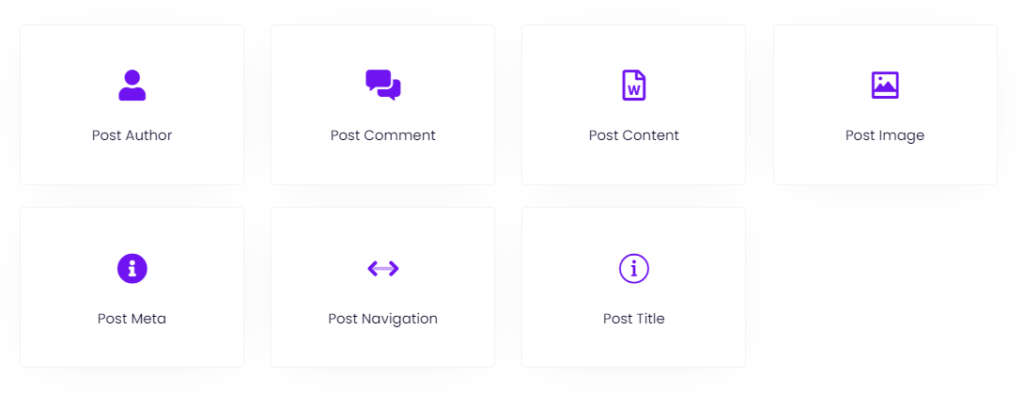
Check out the complete blog builder catalog here.
- The Plus Extensions: As the name suggests, these extra features will help you create a unique website. These include blocks like dark mode, white label, dynamic content, floating effect, hover effect, and more.
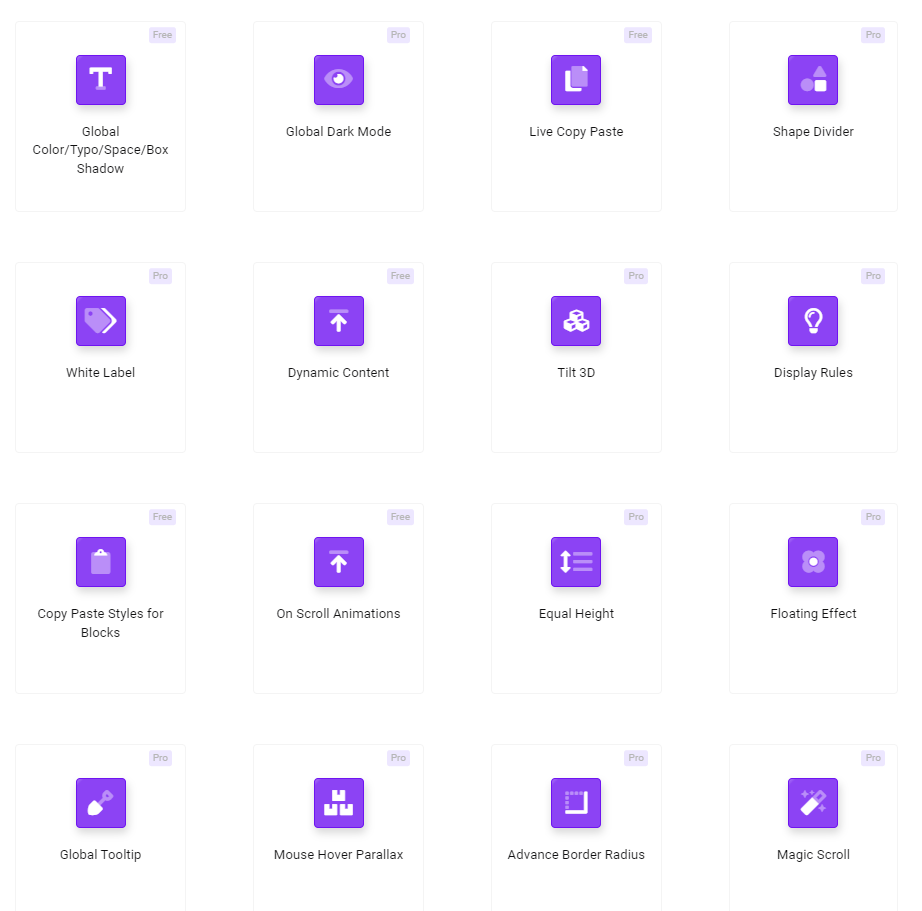
Check out the complete list of Extensions here.
As you saw, you get all Elementor’s features and some more with The Plus Blocks, so you do not need extra plugins or a separate page builder.
Besides, there is also built-in lazy loading, RTL and multi-language support, and an unused block scanner (to disable unused blocks).
Pricing of The Plus Blocks for Gutenberg
The Plus Blocks is a freemium plugin you can download from the WordPress repository. To access advanced features and customizations, upgrade to the pro version starting at just $39/year. There is also a life plan if you prefer to make one-time payments.
2. WPBakery Page Builder
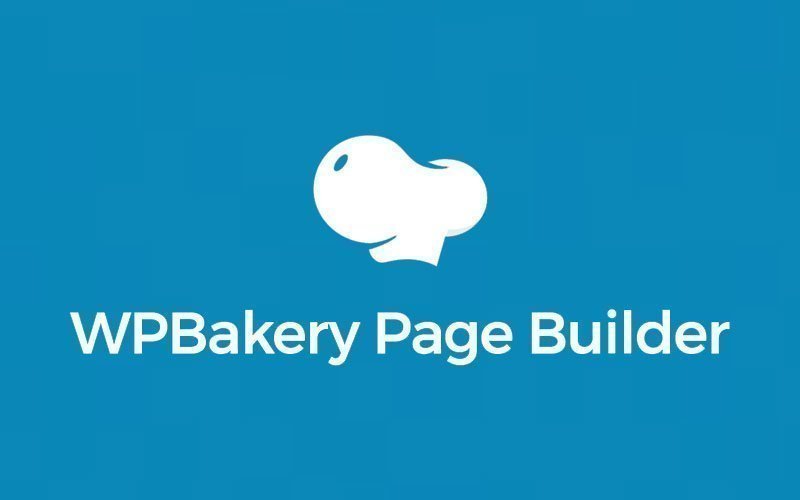
Another alternative to Elementor is the WPBakery page builder for WordPress. Formerly known as Visual Composer, WPBakery lets you create websites without coding expertise.
Similar to Elementor, you get a drag-and-drop page builder to design webpages within minutes.
You can pick from prebuilt layouts to create sections and copy them to build pages quickly. You also get around 50 elements, a template library, and a skin builder. Besides, all designs you create will be responsive and mobile-friendly.
Key Features of WPBakery
- Visual Builder: The page builder allows you to add columns, select a prebuilt layout, and then pick elements you want to add to your webpage.
- Back-end and Front-end Editor: WPBakery comes with both front-end and back-end editors. So, you can create pixel-perfect designs and preview your design before publishing.
- Elements: You get over 50 elements that you can access from the Elements table.
- Prebuilt Templates: WPBakery also has a dedicated templates library where you can pick readymade designs and layouts for your websites.
Pros of WPBakery
- Compatible with WordPress themes and third-party plugins.
- Prebuilt templates
- Allows developers to create custom skins
Cons of WPBakery
- Complicated and clunky interface
- No free version
- Limited premium support and access to the template library
Pricing of WPBakery Page Builder
WPBakery is a premium page builder starting at $59 for one website, $256 for five websites, and $499 for ten websites. Even though you pay once in a lifetime, the tech support and template library access are limited to one year only. There is no free version, but you can try a sandbox demo.
Planning to leverage generative AI for your website content? Read about how to generate AI images in WordPress.
3. Divi
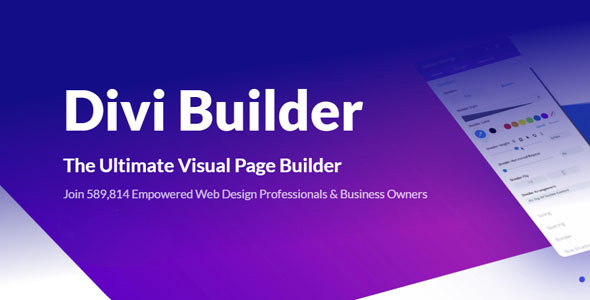
Taking the third spot on our list of best Elementor alternatives is another drag-and-drop builder named Divi by Elegant Themes. With Divi, you get over 40 content elements and over 800 unique prebuilt templates.
All elements are fully customizable so that you can design unique websites easily. Besides, there is also complete theme-building support.
But what makes Divi unique is the built-in A/B test functionality. You can test your designs on different parameters without any third-party plugins.
Key Features of Divi
- Prebuilt Designs: Divi comes with over 800 readymade layouts and website designs that you can use to create functional websites in minutes, making it ideal for beginners.
- Customization Options: Besides templates and content elements, you also get loads of customization options. You can tweak typography, colors, animations, transitions, and more.
- A/B Testing: The built-in A/B testing will come in handy if you want to test different designs to pick the optimum design for your website.
- Responsive Websites: The designs you create using the Divi builder will be responsive and mobile-friendly.
Pros of Divi Page Builder
- Clean user interface
- Plenty of premade designs
- There is a plethora of customization options
- Built-in A/B testing for the webpage
Cons of Divi Page Builder
- Doesn’t have a free version
- Lacks a popup builder
- Struggles with lengthier page designs
Pricing of Divi
Divi is a premium page builder, and you can pick between two paid plans that allow you to create unlimited websites. You can get annual access to Divi for $89/year, or you can pay $249 once for lifetime access. There is no free version available.
Forms are a great way to generate leads and engage with your audiences. Learn about the top 5 WordPress form builder plugins.
4. Brizy

Next on our list is an Elementor page builder alternative, which is free to download – the Brizy page builder. The free version includes over 500 prebuilt blocks for easier website design.
Plus, you also get plenty of customization options to stylize each block.
You can upgrade to the pro version of Brizy page builder to access advanced features and customization options. You also get a popup builder to create beautiful popups.
There’s also a theme builder, WooCommerce builder, and marketing integrations.
Key Features of Brizy
- Clean Builder UI: Brizy has a unique take on the builder interface. Unlike Elementor and other page builders, Brizy does not have a substantial sidebar with all elements and settings. Instead, you only see necessary options.
- Premade Templates: The page builder is also beginner-friendly, giving access to over 500 readymade designs.
- Global Blocks: You also get global blocks to add header, footer, and other elements frequently appearing across webpages. You can use these blocks to eliminate the need to add dedicated blocks for each element whenever you create a new page.
- eCommerce Integrations: You can also create eCommerce sites using Brizy’s e-commerce blocks and marketing integrations.
Pros of Brizy
- Premade templates and global blocks
- Clean UI
- eCommerce integrations
Cons of Brizy
- There is a steeper learning curve if you are used to Elementor or similar page builder interfaces
- Lack of third-party app integrations
Pricing of Brizy
Brizy page builder is free to download but offers limited features. The premium version has four plans – The Personal plan costs $7/month (1 website support), the Freelancer plan costs $12/month (25 websites), the Agency plan costs $21/month (10 sites), and the White Label plan costs $33/month (10 sites). Yearly plans are also available.
5. Oxygen Page Builder
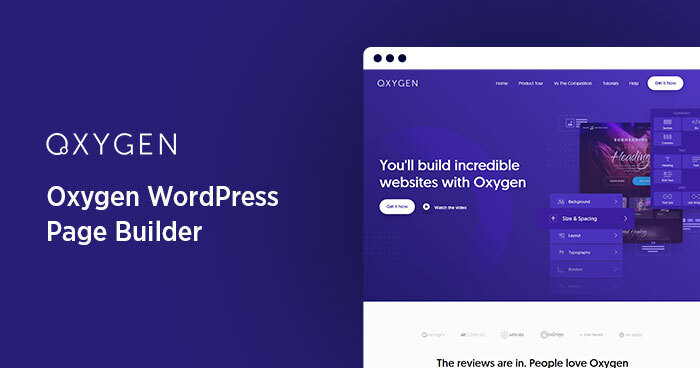
Taking the fifth and final spot on our list of best Elementor alternatives is the Oxygen page builder. Like other page builders, Oxygen also comes with a drag-and-drop visual builder and is one of the best alternative to Elementor.
However, Oxygen is ideal for users who like Elementor’s Flexbox containers because it also supports CSS grids and Flexbox. Besides, you also get many eCommerce elements for your online storefront.
Key Features of Oxygen Page Builder
- Design Library: You can choose to start with a blank canvas or pick a readymade website from Oxygen’s design library.
- Global Styling Options: You can get global styling options to customize typography, colors, headings, animations, links, and more.
- WooCommerce Integration: With Oxygen WooCo and Ultimate paid plans, you get around 20 dedicated WooCommerce blocks to create an online store.
- Flexbox Support: You also get Flexbox support, so designing complex layouts becomes much easier than using regular columns and sections.
Pros of Oxygen Page Builder
- WooCommerce integration
- Flexbox support
- Readymade templates
Cons of Oxygen
- No free version
- The learning curve can be steep due to the confusing interface
Pricing of Oxygen Page Builder
The Oxygen page builder is a premium plugin with three lifetime plans. The basic plan costs $129, the WooCo plan costs $149, and the Ultimate plan costs $179. All plans allow you to create unlimited sites.
Get our best WordPress tips, tricks, and tutorials delivered straight to your inbox - Subscribe to our Monthly Email newsletter Today.
Which Elementor Alternative Works Best for You?
Elementor is popular because it is an intuitive, practical, and easy-to-use page builder. But alternatives mentioned in this blog not only come close but offer better value than Elementor on some parameters. While each page builder on our list is unique, you can pick the perfect one for your website if you know your needs and wants.
Start by asking what purpose the page builder will serve on your website. Do you want more widgets or templates? Do you want granular control over typography, layout, colors, and other design elements? Do you also plan to add eCommerce functionalities to your website?
Our recommendation would be the Gutenberg block editor since it is free and preinstalled in WordPress as the default editor. Additionally, you can enhance your Gutenberg functionality by using The Plus Blocks for Gutenberg by POSIMYTH Innovations. This Gutenberg addon gives you access to customizable blocks optimized for performance.
For just $39/year, you’ll get over 85 Gutenberg blocks, a blog builder, header builder, WooCommerce builder, loads of customization options, and more. Download today!
Further Read: Planning to use Flexbox containers in Elementor page builder? Check out our beginner’s guide to Elementor Flexbox containers.
FAQs about Elementor Alternatives
Is Elementor a theme or a plugin?
Elementor is a plugin for WordPress, not a theme. Once you install it, you get an option “Edit with Elementor” to edit posts and pages using the Elementor page builder. But Elementor does have a WordPress theme called Hello Elementor which you can download separately.
Is Gutenberg page builder free?
Yes, Gutenberg is a free page builder. It is the default page builder for WordPress, so you do not need to install it separately.
Are there any free alternatives to Elementor Page Builder?
Gutenberg block editor and Brizy builder are two popular free alternatives to the Elementor page builder.
Is Gutenberg better than Elementor?
Gutenberg is a newer page builder compared to Elementor. But it does do certain things better than its competitor. First, it is preinstalled on your WordPress setup by default. Second, it includes all necessary blocks or widgets, including payment processing, theme builder blocks, third-party app embeds, and more. So, you can create a professional website with advanced features without spending extra cash.





